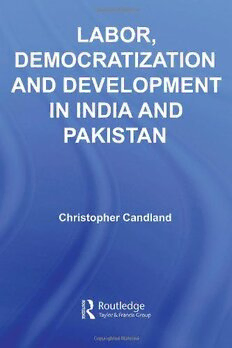
Labor, Democratization and Development in India and Pakistan (Routledge Contemporary South Asia) PDF
225 Pages·2008·1.51 MB·English
Most books are stored in the elastic cloud where traffic is expensive. For this reason, we have a limit on daily download.
Preview Labor, Democratization and Development in India and Pakistan (Routledge Contemporary South Asia)
Description:
In this first comparative study of organized labor in India and Pakistan, the author analyses the impact and role of organized labor in democratization and development. The study provides a unique comparative history of Indian and Pakistani labor politics. It begins in the early twentieth century, when permanent unions first formed in the South Asian Subcontinent. Additionally, it offers an analysis of changes in conditions of work andterms of service in India and Pakistan and of organized labor’s response. The conclusions shed new light on the influence of organized labor in national politics, economic policy, economic welfare and at the workplace. It is demonstrated that the protection of workers has desirable outcomes not only for those workers covered but also for democratic practice and for economic development.
See more
The list of books you might like
Most books are stored in the elastic cloud where traffic is expensive. For this reason, we have a limit on daily download.
